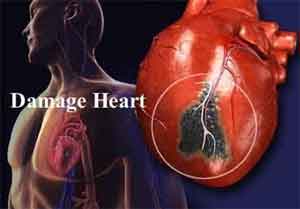- Home
- Editorial
- News
- Practice Guidelines
- Anesthesiology Guidelines
- Cancer Guidelines
- Cardiac Sciences Guidelines
- Critical Care Guidelines
- Dentistry Guidelines
- Dermatology Guidelines
- Diabetes and Endo Guidelines
- Diagnostics Guidelines
- ENT Guidelines
- Featured Practice Guidelines
- Gastroenterology Guidelines
- Geriatrics Guidelines
- Medicine Guidelines
- Nephrology Guidelines
- Neurosciences Guidelines
- Obs and Gynae Guidelines
- Ophthalmology Guidelines
- Orthopaedics Guidelines
- Paediatrics Guidelines
- Psychiatry Guidelines
- Pulmonology Guidelines
- Radiology Guidelines
- Surgery Guidelines
- Urology Guidelines
Trigger for repairing and self-healing of damaged heart cells found

New research has discovered a potential means to trigger damaged heart cells to self-heal. The discovery could lead to groundbreaking forms of treatment for heart diseases. For the first time, researchers have identified a long non-coding ribonucleic acid (ncRNA) that regulates genes controlling the ability of heart cells to undergo repair or regeneration. This novel RNA, which researchers have named "Singheart", may be targeted for treating heart failure in the future. The discovery was made jointly by A*STAR's Genome Institute of Singapore (GIS) and the National University Health System (NUHS), and is now published in Nature Communications.
Unlike most other cells in the human body, heart cells do not have the ability to self-repair or regenerate effectively, making heart attack and heart failure severe and debilitating. Cardiovascular disease (CVD) is the leading cause of death worldwide, with an estimated 17.7 million people dying from CVD in 2015 . CVD also accounted for close to 30% of all deaths in Singapore in 2015 .
In this project, the researchers used single cell technology to explore gene expression patterns in healthy and diseased hearts. The team discovered that a unique subpopulation of heart cells in diseased hearts activate gene programmes related to heart cell division, uncovering the gene expression heterogeneity of diseased heart cells for the first time. In addition, they also found the "brakes" that prevent heart cells from dividing and thus self-healing. Targeting these "brakes" could help trigger the repair and regeneration of heart cells.
"There has always been a suspicion that the heart holds the key to its own healing, regenerative and repair capability. But that ability seems to become blocked as soon as the heart is past its developmental stage. Our findings point to this potential block that when lifted, may allow the heart to heal itself," explained A/Prof Roger Foo, the study's lead author, who is Principal Investigator at both GIS and NUHS' Cardiovascular Research Institute (CVRI) and Senior Consultant at the National University Heart Centre, Singapore (NUHCS).
"In contrast to a skin wound where the scab falls off and new skin grows over, the heart lacks such a capability to self-heal, and suffers a permanent scar instead. If the heart can be motivated to heal like the skin, consequences of a heart attack would be banished forever," added A/Prof Foo.
The study was driven by first author and former Senior Research Fellow at the GIS, Dr Kelvin See, who is currently a Postdoctoral Researcher and Mack Technology Fellow at University of Pennsylvania.
"This new research is a significant step towards unlocking the heart's full regenerative potential, and may eventually translate to more effective treatment for heart diseases. Heart disease is the top disease burden in Singapore and strong funding remains urgently needed to enable similar groundbreaking discoveries," said Prof Mark Richards, Director of CVRI.
Executive Director of GIS, Prof Ng Huck Hui added, "This cross-institutional research effort serves as a strong foundation for future heart studies. More importantly, uncovering barriers that stand in the way of heart cells' self-healing process brings us another step closer to finding a cure for one of the world's biggest killers."

Disclaimer: This site is primarily intended for healthcare professionals. Any content/information on this website does not replace the advice of medical and/or health professionals and should not be construed as medical/diagnostic advice/endorsement or prescription. Use of this site is subject to our terms of use, privacy policy, advertisement policy. © 2020 Minerva Medical Treatment Pvt Ltd